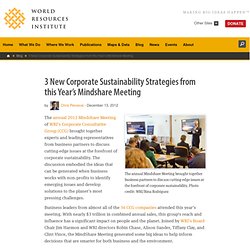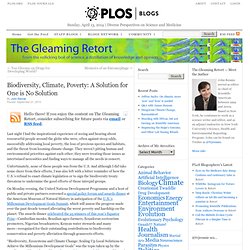

Environmental Performance Index. 3 New Corporate Sustainability Strategies from this Year’s Mindshare Meeting. The annual 2012 Mindshare Meeting of WRI’s Corporate Consultative Group (CCG) brought together experts and leading representatives from business partners to discuss cutting-edge issues at the forefront of corporate sustainability.

The discussion embodied the ideas that can be generated when business works with non-profits to identify emerging issues and develop solutions to the planet’s most pressing challenges. Business leaders from almost all of the 36 CCG companies attended this year’s meeting. With nearly $3 trillion in combined annual sales, this group’s reach and influence has a significant impact on people and the planet. Joined by WRI’s Board Chair Jim Harmon and WRI directors Robin Chase, Alison Sander, Tiffany Clay, and Clint Vince, the MindShare Meeting generated some big ideas to help inform decisions that are smarter for both business and the environment. 3 Ideas to Boost Corporate Sustainability We had a stimulating two days with corporate leaders.
Center for Science and Technology Policy Research. Reduce emissions before trying climate engineering. With so little being done politically on climate change, Dana Milbank ["Plan B on climate change," op-ed, Oct. 17] noted that scientists want to research additional measures, often called geoengineering or, better, climate engineering.

Removing carbon dioxide from the atmosphere will be essential, but it will have a significant effect only with sharp emissions reductions. Reducing warming by interfering with incoming solar radiation appears possible but is likely to have unintended side effects and involves difficult governance issues. Climate engineering thus makes sense as a strategy only after making commitments to limit emissions. The United States needs to take the lead and demonstrate the technical ingenuity to show that a modern economy can prosper with low greenhouse gas emissions, and Congress needs to enact incentives for this to happen. Michael MacCracken, Washington The writer is chief scientist for climate-change programs at the Climate Institute. After the spending cuts: our step-by-step guide to greening your local council - How to Make a Difference. Getting the ball rolling Your first step is to go to your council's website and find out what it is already doing about climate change and sustainability issues.

Is it among the low-carbon pioneers or a climate-denying laggard? All councils operate in response to multiple agendas and pressures, so unless there is an active interest from local people to serve as a counterweight to the power of special interests and central government, the chances are that your council isn't doing very much. So the next thing to do is find out if there is a Transition Initiative, Low Carbon Community or Friends of the Earth (FoE) group active in your area.
You will be taken much more seriously if you are working with an established group representing a concerned constituency of local residents rather than operating as a lone nut. Your council's Local Strategic Partnership (LSP) is a good place to start interacting with your council. Biodiversity, Climate, Poverty: A Solution for One is No Solution. Hello there!

If you enjoy the content on The Gleaming Retort, consider subscribing for future posts via email or RSS feed. Last night I had the inspirational experience of seeing and hearing about resourceful people around the globe who were, often against steep odds, successfully addressing local poverty, the loss of precious species and habitats, and the threat from looming climate change. They weren’t pitting human and environmental priorities against each other; they were treating those issues as intertwined necessities and finding ways to manage all the needs in concert. Unfortunately, none of those people was from the U.S.
And although I did take some cheer from their efforts, I was also left with a bitter reminder of how the U.S.’s refusal to enact climate legislation or to sign the biodiversity treaty threatens to undermine the good efforts of those intrepid groups. Energy Efficiency, Consumption and Carbon Pricing. The Breakthrough Institute features a post with the title “ Why Energy Efficiency Does not Decrease Energy Consumption ,” which I suspect people on various sides of the climate policy issue may take as either fighting words or a rallying cry. Personally, it leaves me wondering whether it serves as yet another reminder that policies aimed at reforming energy usage, while desirable, may be harmful unless explicitly tied to curbs on carbon emissions. Solid-state lighting. (Credit: Wikipedia) The post discusses a recent report in the “ Solid-state lighting: an energy-economics perspective ,” by a team of scientists at Sandia National Laboratories and energy economist Harry D.
Saunders. As energy economists have long recognized, the answer is less straightforward than it might seem. And of course, the efficiency argument for lighting theoretically applies to many if not all areas of conservation, which may have their own forms of rebound phenomena. As Saunders concludes (emphasis added): ClimatePolicy.